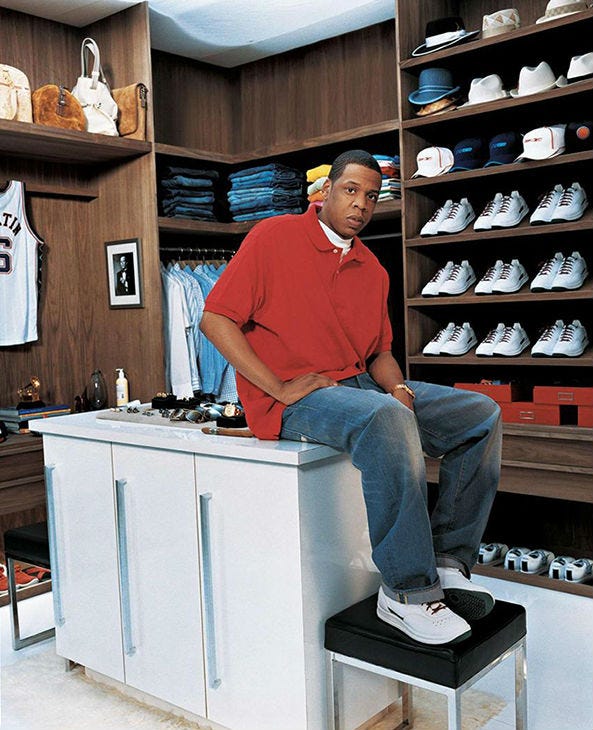Reebok’s were some of the biggest sneakers to hit the market in the early 2000s. If you weren’t into Nike or Adidas, you were more than likely wearing Reeboks - and I’m sure at some point you owned a pair of “soldiers” — word to Cash Money.
However, with Nike gaining ground with a new generation of young people in the early 90s (courtesy of the Jordan Brand), Reebok was struggling.
They were due to collapse, that is until they tapped into the cultural power of Hip-hop.
Today we’re gonna into that, but let’s talk basketball first…
AI SET THE STAGE FOR A MASSIVE COMEBACK
Reebok’s first move to regain its place in the market happened in the 90s when the NBA was in a Golden era. Michael Jordan’s 2nd championship run with the Bulls was in effect, and there was a ton of buzz around the 1996 draft class — a class that included Kobe Bryant & Allen Iverson.
Allen Iverson was projected to be the #1 pick of the draft, and though he was a young college student who had yet to play one NBA game, A bidding war erupted between Nike & Reebok.
With Nike already having access to Michael Jordan and a slew of other basketball stars, they honestly slept on AI. Reebok, on the other hand, wasn’t so sluggish and they swooped in to sign him.
The best part?They already designed AI’s first signature sneaker prior to signing. The show was dubbed “The Question.”
“The Question” proved to be incredibly successful, and because AI lived up to the hype, Reebok couldn’t keep the shoes on the shelve. They were a massive hit, and a huge blow to Nike, who would eventually see a slump in popularity heading into the 2000s.
Reebok’s popularity via AI kept the company afloat for some time. However, after a few iterations of the shoe and AI’s issues with the league, Reebok needed a new brand partner that could keep its story alive.
They found the perfect partner in JAY-Z.
REEBOK X SHAWN CARTER
In 2003 while the AI sneaker was at its height, Reebok knew they had a short window of time to stick it to Nike. Every shoe brand signed athletes - that was the standard, but virtually none of their competitors signed entertainers. That was something typically reserved for fashion brands.
In a stroke of strategic genius, they formed a partnership with Jay Z. In the words of Todd Krinsky from Reebok:
“We had this infamous meeting at the boardroom where the chairman of the brand was saying, ‘We have to get more relevant. If it’s not basketball, and it’s music, tell me who,'” Krinsky added. “I said to him, ‘There’s definitely one guy but it’s going to be hard to get him.’ He was like, ‘Who?’ Then I said, ‘Jay-Z.'”
Jay-Z wasn’t your average rapper.
He ran a highly successful record label and had brand partnerships extending outside of music into verticals like film, and tech. In short, he was rap’s first entertainment mogul - reaching beyond the realm of music because he’s not a businessman, he’s a business man.
Jay had released Blueprint 2 a year prior and signaled that his 2003 LP “The Black Album” would be his last album before retiring. It was the perfect time for Reebok to prep a campaign for Jay, and according to digital trends, Reebok shipped over 500,000 pairs of the S. Dot Carter.
BUT REEBOK WASN’T DONE YET…
During the same year that Reebok signed Jay-Z, they also partnered with another rap juggernaut: 50 Cent
That year 50 Cent dropped “In Da Club”, Get Rich or die Tryin' album, and it was when he established his own label G-Unit.
50 was the hottest artist in the world at the time, and considering the success they were having with Jay's signature shoe, Reebok decided to double down.
In an earlier post, I talked about how 50 used his success to create a branded house, and part of that branded house was G-Unit apparel. And G-Unit’s biggest seller? The sneakers dropped in ‘03.
With two of the biggest stars in Hip-hop music by their side, Reebok was positioned to become the most culturally relevant shoe brand on the market. And though it might’ve been a hefty investment, it paid off.
WHAT ABOUT NOW?
Reebok is getting back into the cultural conversation and routinely does activations with hip-hop stars. They’ve worked with everyone from Camron to Future and are even partnering with high-end fashion brands like Maison Margiela.
I’m not sure if they’ll ever reach the heights they did in 2003, I think Reebok will slowly make a comeback. In fact, I recently saw a Reebok activation at a festival. Who knows, I might cop some classics soon.
Ya never know…
Peace.





